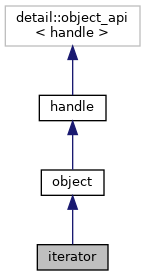|
| reference | operator* () const |
| |
| iterator & | operator++ () |
| |
| iterator | operator++ (int) |
| |
| pointer | operator-> () const |
| |
| template<typename T > |
| T | cast () && |
| |
| template<typename T > |
| T | cast () const & |
| |
| template<> |
| void | cast () const & |
| |
| | object ()=default |
| |
| | object (const object &o) |
| | Copy constructor; always increases the reference count. More...
|
| |
| | object (handle h, borrowed_t) |
| |
| | object (handle h, stolen_t) |
| |
| | object (object &&other) noexcept |
| | Move constructor; steals the object from other and preserves its reference count. More...
|
| |
| object & | operator= (const object &other) |
| |
| object & | operator= (object &&other) noexcept |
| |
| | PYBIND11_DEPRECATED ("Use reinterpret_borrow<object>() or reinterpret_steal<object>()") object(handle h |
| |
| handle | release () |
| |
| | ~object () |
| | Destructor; automatically calls handle::dec_ref() More...
|
| |
 Public Member Functions inherited from handle Public Member Functions inherited from handle |
| template<typename T > |
| T | cast () const |
| |
| template<> |
| void | cast () const |
| |
| bool | check () const |
| |
| const handle & | dec_ref () const & |
| |
| | handle ()=default |
| | The default constructor creates a handle with a nullptr-valued pointer. More...
|
| |
| template<typename T , detail::enable_if_t< detail::all_of< detail::none_of< std::is_base_of< handle, T >, detail::is_pyobj_ptr_or_nullptr_t< T >>, std::is_convertible< T, PyObject * >>::value, int > = 0> |
| | handle (T &obj) |
| | Enable implicit conversion through T::operator PyObject *(). More...
|
| |
| template<typename T , detail::enable_if_t< detail::is_pyobj_ptr_or_nullptr_t< T >::value, int > = 0> |
| | handle (T ptr) |
| |
| const handle & | inc_ref () const & |
| |
| | operator bool () const |
| | Return true when the handle wraps a valid Python object. More...
|
| |
| bool | operator!= (const handle &h) const |
| |
| bool | operator== (const handle &h) const |
| |
| PyObject *& | ptr () |
| |
| PyObject * | ptr () const |
| | Return the underlying PyObject * pointer. More...
|
| |
\rst Wraps a Python iterator so that it can also be used as a C++ input iterator
Caveat: copying an iterator does not (and cannot) clone the internal state of the Python iterable. This also applies to the post-increment operator. This iterator should only be used to retrieve the current value using operator*(). \endrst
Definition at line 1460 of file pytypes.h.

 Public Member Functions inherited from object
Public Member Functions inherited from object Public Member Functions inherited from handle
Public Member Functions inherited from handle Static Public Member Functions inherited from handle
Static Public Member Functions inherited from handle Public Attributes inherited from object
Public Attributes inherited from object Protected Attributes inherited from handle
Protected Attributes inherited from handle